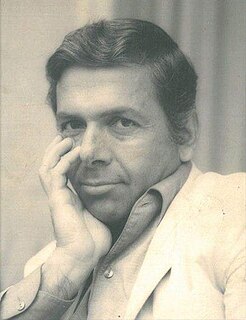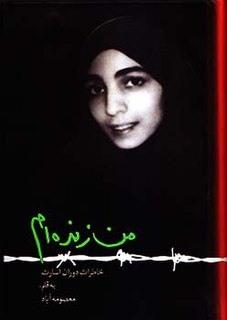Related Research Articles

Zoroastrianism or Mazdayasna is an Iranian religion and one of the world's oldest organized faiths, based on the teachings of the Iranian-speaking prophet Zoroaster. It has a dualistic cosmology of good and evil within the framework of a monotheistic ontology and an eschatology which predicts the ultimate conquest of evil by good. Zoroastrianism exalts an uncreated and benevolent deity of wisdom known as Ahura Mazda as its supreme being. Historically, the unique features of Zoroastrianism, such as its monotheism, messianism, belief in free will and judgement after death, conception of heaven, hell, angels, and demons, among other concepts, may have influenced other religious and philosophical systems, including the Abrahamic religions and Gnosticism, Northern Buddhism, and Greek philosophy.

Richard Nelson Frye was an American scholar of Iranian and Central Asian studies, and Aga Khan Professor Emeritus of Iranian Studies at Harvard University. His professional areas of interest were Iranian philology and the history of Iran and Central Asia before 1000 CE.

Ebrahim Golestan is an Iranian filmmaker and literary figure with a career spanning half a century. He has lived in Sussex, United Kingdom, since 1975.

Abdolhossein Zarrinkoub was a scholar and professor of Iranian literature, history of literature, Persian culture and history.

Touraj Daryaee is an Iranian Iranologist and historian. He currently works as the Maseeh Chair in Persian Studies and Culture and the director of the Dr. Samuel M. Jordan Center for Persian Studies at the University of California, Irvine.
Franklin D. Lewis was an Associate Professor of Persian Language and Literature, and Chair of the Department of Near Eastern Languages and Civilizations at the University of Chicago with affiliations to the Center for Middle Eastern Studies at the University of Chicago. He taught classes on Persian language and literature, medieval Islamic thought, Sufism, Baha'i Studies, translation studies, and Iranian cinema.
Gharbzadegi is a pejorative Persian term variously translated as ‘Westernized’, ‘West-struck-ness’, ‘Westoxification’, ‘Westitis’, ‘Euromania’, or ‘Occidentosis’. It is used to refer to the loss of Iranian cultural identity through the adoption and imitation of Western models and Western criteria in education, the arts, and culture; through the transformation of Iran into a passive market for Western goods and a pawn in Western geopolitics.

Habib Ahmadzadeh is an Iranian author novelist and scriptwriter, born in 1963 in Abadan. The Iran–Iraq War features heavily in his work, with observations of human existence and human interactions in wartime informed by his own wartime service. During the war he rose from being a teenage volunteer Basiji militiaman to become a captain in the regular army.

Two Centuries of Silence is a book written in Persian by Abdolhossein Zarrinkoub, a prominent Iranian scholar of Iran's culture, history and literature. The work is a historical account of the events and circumstances of the first two centuries of the Iranian history following the Arab conquest of Iran in the 7th century AD until the rise of the Tahirid dynasty, a Muslim dynasty of native Iranian origin.

One Woman's War: Da (Mother) is a memoir by Seyyedeh Zahra Hosseini detailing her experiences during the Iran–Iraq War as recorded by Seyedeh Azam Hosseini.
A City Under Siege: Tales of the Iran–Iraq War (2000) (ISBN 978-1568592558) is a collection of nine stories from the Iran–Iraq War by Habib Ahmadzadeh, an Iranian author. The book won awards in Iran and was called one of the top twenty books about the Iran–Iraq War. The book was originally published in 2000 by Sureye Mehr Publication in Persian. Paul Sprachman, professor of Rutgers University translated the book from Persian into English and Mazda Publishers published it in 2010.

Brian J. Spooner is a Professor of Anthropology, Undergraduate Chair at Department of Anthropology at the University of Pennsylvania and Curator of Near Eastern Ethnology at the Penn Museum. His many works are on subjects including Cultural and social anthropology; globalization, Islam, Middle East, South Asia, Central Asia; social organization, religion, ethnohistory, ecology, non-industrial economies.

Chess with the Doomsday Machine is a novel about the Iran-Iraq war by Habib Ahmadzadeh. In 1980, an attack on the Iranian city of Abadan marked the beginning of the Iran-Iraq war. Hundreds of thousands of people fled the badly damaged city but a small number of civilians chose to stay, living in a city under siege. The story focuses on the experiences of Moosa, a young Abadani soldier defending his home town. He has been chosen to assist in destroying the enemy's "Doomsday Machine", a sophisticated radar system.

Fortune Told in Blood(Fal-E Khoon) is a novel by Davud Ghaffarzadegan about an Iraqi lieutenant and soldier in the Iran-Iraq war. The novel known as a modern war story. Fortune Told in Blood's context is an important feature of the novel. The main language of the book is Persian and it was published in 1996 by Soreie Mehr Publication Company. M.R. Ghanoonparvar, emeritus professor of Persian language and literature in the University of Texas, translated the book into English in 2008, published by Center for Middle Eastern Studies at University of Texas at Austin. The Center for Middle Eastern Studies has experience more than 20 years and has published several translated literature book from the Middle East. The book won award of "A Quarter Century of Sacred Defense Books" festival in the novel category between 700 books.

Journey to Heading 270 Degrees is a novel by Ahmad Dehqan. The novel is set during the Iran–Iraq War and focuses on the experiences of a high school student who participates in several operations named Naser. Over 15,000 copies were published in Iran.

I'm Alive is a book written by Masoumeh Abad about her memories in the Iran–Iraq war (1980–88). Masoumeh, who was 17 at the time, was a social worker in a field hospital and in medical clinics for the Iranian Red Crescent Society during the war. The English translation of I'm Alive launched on the Frankfurt Book Fair. I'm Alive has received the Sacred Defense Book of The Year award has been reprinted many times in Iran. The idea for writing the novel came to Abad in 2012.
Niloofar Haeri is an Iranian-American Islamic scholar, anthropologist and linguist. She is a professor in the Department of Anthropology, and the Program Chair in Islamic Studies at Johns Hopkins University.
M.R. Ghanoonparvar is a Professor Emeritus of Persian and Comparative Literature at the faculty of Middle Eastern studies at the University of Texas, Austin, whose expertise includes the works of Simin Daneshvar, Sadeq Chubak, and Sadeq Hedayat.
Nili Rachel Scharf Gold is an Israeli-American professor of modern Hebrew language and literature in the Department of Near Eastern Languages and Civilizations at the University of Pennsylvania. Taking an interdisciplinary approach to the study of modern Hebrew literature, she draws in her research on approaches from psychoanalysis, urban history, diaspora and migration studies, and studies of collective and individual memory. She has published prize-winning books on the Israeli Hebrew poet, Yehuda Amichai, and on the cultural, social, and architectural aspects of the city of Haifa. She has promoted an awareness of modern Hebrew culture in the United States by sponsoring conferences about, and public readings and lectures by, a range of Israeli writers and filmmakers.
References
- ↑ ""سفر به گرای 270 درجه" رمانی جالب برای دانشجویان آمریکایی/ "One Woman's War" "دا"یی برای خارجیزبانها". defapress.ir. Retrieved November 3, 2014.
- ↑ "Paul Sprachman". UK. Retrieved March 2, 2021.
- ↑ "Mazda Publishers - Paul Sprachman". www.mazdapublishers.com. Retrieved March 2, 2021.
- ↑ "paul sprachman". scholar.google.com. Retrieved March 2, 2021.
- ↑ "Serat News Agency".
- ↑ "Press JameJam Online". Archived from the original on July 23, 2015. Retrieved November 17, 2014.
- ↑ "Persian Language Program". web.sas.upenn.edu. Retrieved March 2, 2021.
- ↑ "Mazda Publishers - Two Centuries of Silence". www.mazdapublishers.com. Retrieved March 2, 2021.
- ↑ "Persian Language Program". web.sas.upenn.edu. Retrieved March 2, 2021.